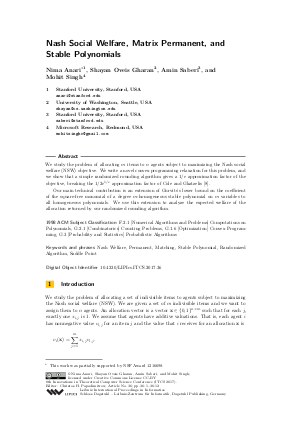Nash Social Welfare, Matrix Permanent, and Stable Polynomials
Authors Nima Anari, Shayan Oveis Gharan, Amin Saberi, Mohit Singh
-
Part of:
Volume:
8th Innovations in Theoretical Computer Science Conference (ITCS 2017)
Part of: Series: Leibniz International Proceedings in Informatics (LIPIcs)
Part of: Conference: Innovations in Theoretical Computer Science Conference (ITCS) - License:
 Creative Commons Attribution 3.0 Unported license
Creative Commons Attribution 3.0 Unported license
- Publication Date: 2017-11-28
File

PDF
LIPIcs.ITCS.2017.36.pdf
- Filesize: 464 kB
- 12 pages
Document Identifiers
Subject Classification
Keywords
- Nash Welfare
- Permanent
- Matching
- Stable Polynomial
- Randomized Algorithm
- Saddle Point
Metrics
- Access Statistics
-
Total Accesses (updated on a weekly basis)
0Document
0Metadata
Abstract
We study the problem of allocating m items to n agents subject to maximizing the Nash social welfare (NSW) objective. We write a novel convex programming relaxation for this problem, and we show that a simple randomized rounding algorithm gives a 1/e approximation factor of the objective, breaking the 1/2e^(1/e) approximation factor of Cole and Gkatzelis. Our main technical contribution is an extension of Gurvits's lower bound on the coefficient of the square-free monomial of a degree m-homogeneous stable polynomial on m variables to all homogeneous polynomials. We use this extension to analyze the expected welfare of the allocation returned by our randomized rounding algorithm.
Cite As Get BibTex
Nima Anari, Shayan Oveis Gharan, Amin Saberi, and Mohit Singh. Nash Social Welfare, Matrix Permanent, and Stable Polynomials. In 8th Innovations in Theoretical Computer Science Conference (ITCS 2017). Leibniz International Proceedings in Informatics (LIPIcs), Volume 67, pp. 36:1-36:12, Schloss Dagstuhl – Leibniz-Zentrum für Informatik (2017)
https://doi.org/10.4230/LIPIcs.ITCS.2017.36
BibTex
@InProceedings{anari_et_al:LIPIcs.ITCS.2017.36,
author = {Anari, Nima and Oveis Gharan, Shayan and Saberi, Amin and Singh, Mohit},
title = {{Nash Social Welfare, Matrix Permanent, and Stable Polynomials}},
booktitle = {8th Innovations in Theoretical Computer Science Conference (ITCS 2017)},
pages = {36:1--36:12},
series = {Leibniz International Proceedings in Informatics (LIPIcs)},
ISBN = {978-3-95977-029-3},
ISSN = {1868-8969},
year = {2017},
volume = {67},
editor = {Papadimitriou, Christos H.},
publisher = {Schloss Dagstuhl -- Leibniz-Zentrum f{\"u}r Informatik},
address = {Dagstuhl, Germany},
URL = {https://drops.dagstuhl.de/entities/document/10.4230/LIPIcs.ITCS.2017.36},
URN = {urn:nbn:de:0030-drops-81489},
doi = {10.4230/LIPIcs.ITCS.2017.36},
annote = {Keywords: Nash Welfare, Permanent, Matching, Stable Polynomial, Randomized Algorithm, Saddle Point}
}
Author Details
References
-
Arash Asadpour, Uriel Feige, and Amin Saberi. Santa claus meets hypergraph matchings. In Approximation, Randomization and Combinatorial Optimization. Algorithms and Techniques, pages 10-20. Springer, 2008.

-
Arash Asadpour and Amin Saberi. An approximation algorithm for max-min fair allocation of indivisible goods. In STOC, pages 114-121, 2007.

-
N Bansal and M Sviridenko. The santa claus problem. In Proceedings of Symposium on Theory of Computing, pages 31-40, 2006.

-
S. Boyd and L. Vandenberghe. Convex Optimization. Cambridge University Press, 2006.

-
Ioannis Caragiannis, David Kurokawa, Hervé Moulin, Ariel D. Procaccia, Nisarg Shah, and Junxing Wang. The unreasonable fairness of maximum nash welfare. In EC, 2016.

-
Deeparnab Chakrabarty, Julia Chuzhoy, and Sanjeev Khanna. On allocating goods to maximize fairness. In Foundations of Computer Science, 2009. FOCS'09. 50th Annual IEEE Symposium on, pages 107-116. IEEE, 2009.

-
Richard Cole, Nikhil R. Devanur, Vasilis Gkatzelis, Kamal Jain, Tung Mai, Vijay V. Vazirani, and Sadra Yazdanbod. Convex program duality, fisher markets, and nash social welfare. submitted, 2016.

-
Richard Cole and Vasilis Gkatzelis. Approximating the nash social welfare with indivisible items. In STOC, pages 371-380. ACM, 2015.

-
Shmuel Friedland and Leonid Gurvits. Lower bounds for partial matchings in regular bipartite graphs and applications to the monomer-dimer entropy. Combinatorics, Probability and Computing, 17(03):347-361, 2008.

-
Osman Güler. Hyperbolic polynomials and interior point methods for convex programming. MOR, 22(2):350-77, 1997.

-
Leonid Gurvits. Hyperbolic polynomials approach to van der waerden/schrijver-valiant like conjectures: Sharper bounds, simpler proofs and algorithmic applications. In STOC, STOC '06, pages 417-426, 2006.

-
Mark Jerrum, Alistair Sinclair, and Eric Vigoda. A polynomial-time approximation algorithm for the permanent of a matrix with nonnegative entries. J. ACM, 51(4):671-697, July 2004.

-
Euiwoong Lee. Apx-hardness of maximizing nash social welfare with indivisible items. arXiv preprint arXiv:1507.01159, 2015.

-
Hervé Moulin. Fair division and collective welfare. MIT press, 2004.

-
Nhan-Tam Nguyen, Trung Thanh Nguyen, Magnus Roos, and Jörg Rothe. Computational complexity and approximability of social welfare optimization in multiagent resource allocation. Autonomous agents and multi-agent systems, 28(2):256-289, 2014.

-
Trung Thanh Nguyen and Jörg Rothe. Minimizing envy and maximizing average nash social welfare in the allocation of indivisible goods. Discrete Applied Mathematics, 179:54-68, 2014.

-
Aleksandar Nikolov and Mohit Singh. Maximizing determinants under partition constraints. In Proceedings of the 48th Annual ACM SIGACT Symposium on Theory of Computing, STOC 2016, Cambridge, MA, USA, June 18-21, 2016, pages 192-201, 2016.

